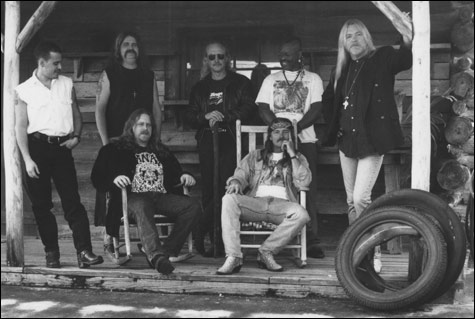
SOUTHERN REVIVAL: The Allman Brothers led the cultural wave of Southern mania that Jimmy Carter rode to the White House. |
The Tote Board’s preliminaries are almost over, meaning next week we begin to set the odds. During the past two weeks, we’ve listed four rules that shape presidential politics. This week, in the last of our three-part introduction, we set out the final important rule that candidates ignore at their peril:
Rule 5: Candidates who tie their campaigns to popular culture have a better chance of getting elected.
Presidential politics and pop culture are inseparable. In the modern age, the campaign is brought to us largely through television (the Internet plays a role, but despite extravagant claims to the contrary, it’s still a relatively minor one). As a result, campaigns have taken on the attributes of long-running series; just as a character on Grey’s Anatomy or Lost has to wear well for a long time on the small screen or face the consequences, so too it goes for candidates.
The two are suited to each other, with a history that long precedes the birth of TV. Beginning in the 19th century, politics took on a cultural role similar to that of sports. With its rallies, shop talk, fraternal bonding, and last but not least, voting in saloons, the American political system became further aligned with our culture.
Given this bond, candidates who want to wage strong campaigns must understand the media of their age. Critics may have decried the way Ronald Reagan was able to use television (in large part because of his prior experience in Hollywood), for instance, but they forget that Abraham Lincoln did much the same thing with his use of photography a century before. That technology was somewhat new in the 1850s and 1860s, yet Lincoln was photographed an extraordinary number of times, which in those days often meant sitting for long periods in a studio.
That was no accident: Lincoln was, after all, the only president to alter his appearance radically between his election and his first inauguration, which shows that he was as concerned about his image as any politician is today.
All this is to say, then, that candidates who can connect their campaigns to pop-culture trends have a much better chance of getting elected. In 1976, Jimmy Carter rode a cultural wave of Southern mania, as he tied his campaign to the rise of southern rock (the Allman Brothers and Marshall Tucker both gave concerts for Carter) and the appeal of movies such as Network and, with its glorification of outsiders, Nashville. “I am not a lawyer,” Carter was prone to say, aping a line from Nashville in hopes of drawing applause.
In 1988, Michael Dukakis benefited from a similar sway of cultural interest. At the time, Boston was home to the tech-based “Massachusetts miracle,” the wildly popular sitcom Cheers, and the Celtics, with star player Larry Bird. By emphasizing his Greek roots, Dukakis also attempted to ride the appeal of the immigrant saga, then being popularized in films such as Moonstruck (starring his cousin, Olympia, who introduced him at the Democratic Convention) and Coming to America.
And so it goes. In 1979, astute observers of popular culture might have noticed the rising popularity of a new TV show named Dallas. And they might have concluded that a TV nation suddenly celebrating the conservative business values of the Sun Belt would be more willing to support a candidate such as Ronald Reagan.
Or in 1992, they might have looked at the growing popularity of country music and female buddy movies such as A League of Their Own and concluded that the Clinton-Gore “bubba-boy with wives” ticket, headquartered in the same region as the city of Nashville might be a winner.
Yet forecasting a race based on popular culture isn’t always so easy; cultural trends can change — and often do, quickly and radically. Given that this race is starting so early, issues that dominate discussions now are likely to become less cogent overtime.
Still, we can make some initial pop-culture predictions. Any new massive pop-culture trend should be closely watched, since it will likely have political spillover. Even a show such as American Idol, for instance, where a total unknown can win the big prize, can have political ramifications if the phenomenon is large enough.
The 2008 election will also be unique in that it will see the nation’s first serious presidential bids by black, female, and Hispanic candidates. Because a presidential campaign is a kind of national conversation, this year’s race will thus provide the country with an opportunity to assess what and how it thinks about race, gender, and ethnicity. Watch closely to see if there’s anything in pop culture (a Thelma and Louise or a Roots) that addresses issues of race and gender; they may tell you something about the campaign.
Ditto for John Edward’s emphasis on poverty and “two Americas.” If that really is going to catch on, expect to see similar ventures in pop culture, a Norma Rae clone perhaps.
Right now, the major beneficiary of the tie between pop culture and politics is Rudy Giuliani. September 11, which seared an imprint in the nation’s consciousness, did not begin as a pop-culture event. But over the years, it has been reinforced continually through television news specials, anniversary retrospectives, and movies such as United 93 and Oliver Stone’s World Trade Center.
As a result, New York — once considered an enemy of heartland values — has been transformed into a place dear to the nation’s heart.
Giuliani was one of that day’s heroes. And, as shown by this year’s early poll results, Americans remember his role in that tragedy with something approaching reverence. It’s largely what makes him such a formidable candidate
Next week: finally! The odds for the Republicans.
On the Web
The Phoenix Presidential Toteboard: http://www.thephoenix.com/toteboard